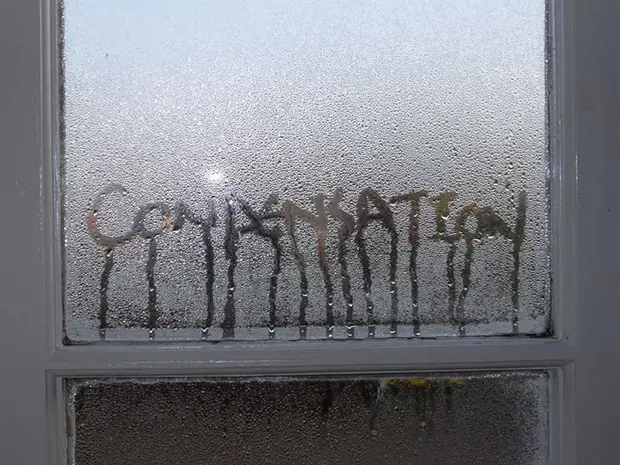Frustrated with foggy and wet window panes during the winter season? Cold temperatures during the winter can bring extra headaches aside from drafty windows. For example, condensation on the windows in winter can point to several problems. New England homeowners should take note if they discover moisture on windows in winter this time of year.
Table of Contents
When you have winter condensation on windows, it’s not something to ignore. If the fog on your windows won’t wipe away, consider the following advice about window moisture and condensation along with how to remove it.
Wait! What is Window Condensation?

Oh, the woes of window condensation. Window condensation is moisture on windows in winter that forms on glass window panes. In some circumstances, condensation is perfectly normal. It forms when warm air comes in contact with a cool pane of glass, much like a glass of lemonade on a hot summer day.
From there, moisture forms on the glass. Winter condensation on windows that wipes away is not a cause for concern. It will go away on its own or when you wipe it away with your hand!
The troubling part about condensation is when it forms inside the glass. If the condensation does not wipe away, it’s a sign of seal failure. This means that your windows are no longer performing properly and need to be replaced.
But what about condensation on windows in winter? This is a different story.
So, How Does Condensation Happen?
What’s the perfect storm that makes condensation form on your windows? Here’s how it works: when the outdoor temperatures drop, it creates temporary condensation. In fact, winter condensation on windows is more likely to form when it’s really cold outside.
This is because the temperature surface of the inside glass drops. The condensation forms during cold days with lower relative humidity. Humidity is water vapor mixed with air, although cool air can’t hold as much moisture as warm air.
The reason why condensation on the windows in winter forms first is that the glass is the coldest surface available. Surfaces that are cooler than room temperature are more likely to show humidity, so you will see water droplets on the glass.
Stop! Why Worry About Winter Window Condensation?
When should you worry about foggy windows in the winter? Winter condensation on windows is a little more concerning. That’s because window moisture inside during the winter can lead to a myriad of problems for your home and health.
Here’s why:
Excess Humidity
If the humidity levels in your home are too high, you can see moisture on windows in winter. Excess humidity in the home can come from several sources, including your heating system, plants, and daily activities such as showering and dishwashing.
Too much humidity can even cause condensation to form on your walls. From there, the humidity continues to spread.
Mold & Mildew Growth
One of the worst results of winter window condensation is mold and mildew growth. Mold can grow inside during the winter because it has access to a warm and humid environment. When it’s dark and there is a food source such as wood frames, mold will grow.
Peeling Interior Paint
When condensation on the windows in winter manages to form on the walls, you might experience peeling paint. This is a sign that there is a prolonged moisture and humidity problem inside the home that must be corrected.
How to Correct Winter Window Condensation
Note that any windows can collect condensation. Even new windows!
Adjusting the humidity levels in your home can help, which is achieved by the following:
- Ventilate the room if you are cooking or showering
- Use a dehumidifier and exhaust fans as needed
- Vent your clothes dryer to go directly outside
- Reduce the amount of humidity-producing plants in your home, including spider plants, English ivy, and jade
- Consider the fact that heat rises, which can contribute to the natural process of humidity on top floor levels in a home
- Aim to keep your home at humidity levels between 30% and 50%. This is considered ideal humidity for homes.
Install High-Performance Windows from Coastal Windows & Exteriors

Coastal Windows & Exteriors offers windows that form an airtight seal against the elements. Our replacement windows make your home draft-free, comfortable, and reduce moisture on windows in winter, especially in terms of leaks.
Keep in mind that if you install new windows, you may experience even more condensation. Don’t panic! This is because energy-efficient windows help eliminate airflow and become more efficient at keeping moist air in your home.
Take a look at some of our window replacement projects that help prevent condensation:
Window Installation in New England
- Window Installation in Rye, NH
- Window Installation in Fitchburg, MA
- Window Installation in Marblehead, MA
- Window Installation in Nahant, MA
If you find condensation on the windows in winter, we are happy to take a look and determine if a replacement is in order. Do you have condensation between your glass panes that won’t wipe away? Be sure to contact us immediately for a quote!


